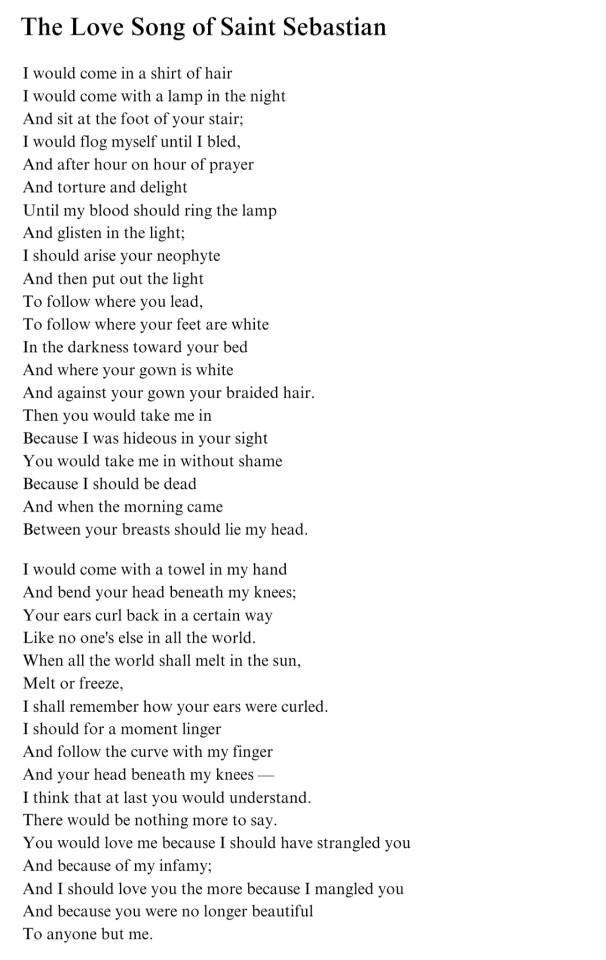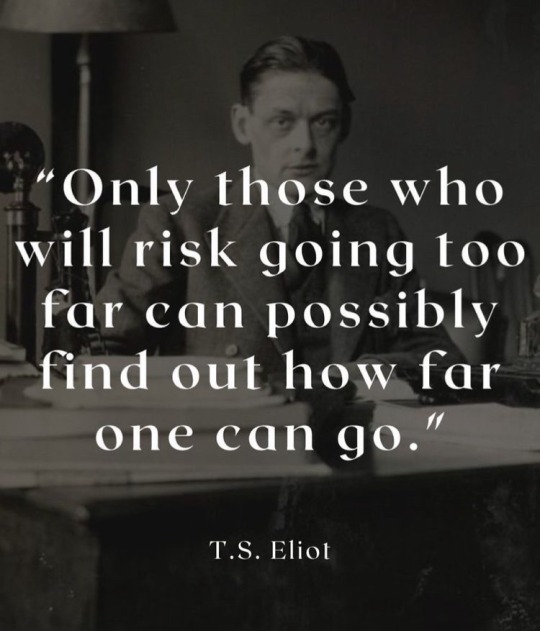#t.s eliot
Text
























martian + excerpts from T.S Eliot's The Journey of the Magi
#sebmark#sebastian vettel#mark webber#f1#web weave#t.s eliot#in mark's own words: [they're] fine now#my humble contribution to#martian monday#frothing at the mouth for the chance to be able to explain the poetry
97 notes
·
View notes
Text

T. S Eliot, “The Love Song of Saint Sebastian”
#Poems I Know By Heart#T.S Eliot#The Love Song of Saint Sebastian#Poetry#American Literature#Lit#Full Poem#Quotes#Dark Academia
15 notes
·
View notes
Text
The purpose of literature
is to turn blood into ink.
T.S Eliot
9 notes
·
View notes
Text

#october 2023#moody october#occult october#dark october#spooky october#spooky season#the simpsons#marge simpson#bewitched#samantha stephens#elizabeth montgomery#male beauty#art#art history#ts elliot#t.s eliot#moodboard#theme#occult#vampires#moody#october magic#magic october#witches
6 notes
·
View notes
Text
“…bach’ın bir çello sonatı gibi yaşıyorum: hiçbir yere bağlanmadan, askıda, ezgin, muğlak, her insanın hemen kavramasına rağmen, özünde anlaşılmaz.”
wilhelm genazino - mutsuzluk zamanlarında mutluluk
#wilhelm genazino#aşk aptallığı#jacgues alain miller#alain de botton#gülünesi aşklar#milan kundera#kazuo ishiguro#günden kalanlar#bir gün batımının ayrıntıları#vladimir nabokov#lolita#frederic chopin#sebastian bach#çello#blogger#ee cummings#t.s eliot#selected poems#nietzsche ağladığında#friedrich nietzsche#tan kızıllığı#ecce homo#hamlet#william shakespeare#othello#romeo ve juliet#ahmet altan#anna akhmatova#felsefe#blog
28 notes
·
View notes
Text
Learning that T.S Eliot most likely had a romantic relationship with John Verdenal is literally insane. It gives so much more meaning to his evangelical poetry. Like, reading The Journey of The Magi from a queer perspective?? Sublime. This man was so fruity he went to live in a flat with 4 men because he was trying to escape his first wife. With this wife, he also made a vow of celibacy WHEN they were married???!!! That is literally insane. Also, have u seen the dedication he left for Verdenal in his poetry collection Prufrock and Other Observations, after Verdenal died at Gallipoli and Eliot was depressed?? Bro fr said
"Or puoi la quantitate
Comprender dell' amor ch'a te mi scalda,
Quando dismento nostra vanitate,
Trattando l'ombre come cosa salda."
Which translates to:
"Now can you understand the quality of love that warms me towards you, so that I forget our vanity, and treat the shadows like the solid thing".
Also this: "I am willing to admit that my own retrospect is touched by a sentimental sunset, the memory of a friend coming across the Luxembourg Gardens in the late afternoon, waving a branch of lilac, a friend who was later (so far as I could find out) to be mixed with the mud of Gallipoli."??
It is also said that the Wasteland can be interpreted as:
At some previous time, the speaker has fallen completely (perhaps the right word is 'irretrievably') in love.
The object of this love was a young man who soon afterward met his death, it would seem by drowning. (Which is how Eliot thought that Verdenal drowned???)
Enough time has now elapsed since his death for the speaker to have realized that the focus for affection that he once provided is irreplaceable.
The monologue which, in effect, the poem presents is a meditation upon this deprivation, upon the speaker's stunned and horrified reactions to it, and on the picture which, as seen through its all but insupportable bleakness, the world presents.
And this :"Poetry is not a turning loose of expression, but an escape from emotion; it is not the expression of personality, but an escape from personality"?????
Like omfg? Using Poetry as a method to escape the shame and "immorality" of queer love and feelings. Escaping your own mind and personality because you cannot live with the feelings that your God does not allow you to have??
But I think what gets me the most is how any time he got queer accusations he would burn his letters between Verndal and him as well as any other evidence of him being in a queer romance??
Anyway moral of the story is that T.S Eliot's poetry embodies queer yearning and the wish for normalcy in a world that condemns individuality.
#t.s eliot#journey of the magi#wasteland#queer poetry#why did i not know this eariler#if anyone has anything else to add please add it
2 notes
·
View notes
Text
We die to each other daily. What we know of other people is only our memory of the moments during which we knew them. And they have changed since then. To pretend that they and we are the same is a useful and convenient social convention which must sometimes be broken. We must also remember that at every meeting we are meeting a stranger.
T.S. Eliot, The Cocktail Party, 1948
#t.s eliot#The Cocktail Party#play#literary text#books and libraries#quotes#world literature#dark academic aesthetic#classic art lit#classical theatre#strangers
26 notes
·
View notes
Text
'Oppenheimer, Christopher Nolan's sweeping new biographical thriller about the "father of the atomic bomb", has opened to a glowing reception around the world. In India, it's been a hit too but some have protested against a scene depicting the scientist reading the Bhagavad Gita, one of Hinduism's holiest books, after sex. Oppenheimer learnt the ancient Sanskrit language and counted the book as one of his favourites.
In July 1945, two days before the explosion of the first atomic bomb in the New Mexico desert, Robert Oppenheimer recited a stanza from the Bhagavad Gita, or The Lord's Song.
Oppenheimer, a theoretical physicist, had been introduced to Sanskrit, the ancient Indian language, and subsequently the Gita, as a teacher in Berkeley years before. More than 2,000-year-old, Bhagavad Gita is part of the Mahabharata - one of Hinduism's greatest epics - and at 700 verses, the world's longest poem.
Now, hours before an event that would change history, the "father of the atomic bomb" relieved his tension by reciting a stanza he had translated from Sanskrit:
In battle, in forest, at the precipice of the mountains
On the dark great sea, in the midst of javelins and arrows,
In sleep, in confusion, in the depths of shame,
The good deeds a man has done before defend him
As Kai Bird and Martin J Sherwin write in their authoritative 2005 biography American Prometheus: The Triumph and Tragedy of J Robert Oppenheimer, a young Oppenheimer was introduced to Sanskrit by Arthur W Ryder, a professor of Sanskrit at the University of California, Berkeley. The precocious physicist had arrived there as a 25-year-old assistant professor. Over the next few decades, he helped build one of the "greatest schools of theoretical physics" in the US.
Ryder, a Republican and a "sharp tongued iconoclast", was fascinated by Oppenheimer. For his part, Oppenheimer regarded Ryder as a "quintessential intellectual", a scholar who "felt and thought and talked as a stoic". The young scientist's textile importer father agreed, saying Ryder was a "remarkable combination of austereness through which peeps the gentlest soul".
Oppenheimer - played by actor Cillian Murphy in the biopic - also regarded Ryder as a rare person who had "a tragic sense of life, in that they attribute to human actions the completely decisive role in the difference between salvation and damnation".
Soon, Ryder was giving Oppenheimer private lessons in Sanskrit on Thursday evenings. "I am learning Sanskrit," the scientist wrote to his brother Frank, "enjoying it very much and enjoying again the sweet luxury of being taught".
Many of his friends found his new obsession with an Indian language odd, Oppenheimer's biographers noted. One of them, Harold F Cherniss, who introduced the scientist to the scholar, thought it made "perfect sense" because Oppenheimer had a "taste of the mystical and the cryptic".
So Oppenheimer's knowledge of Sanskrit and the Gita is clearly germane to telling his story. But some right wing Hindus have complained - particularly about the sex scene with lover Jean Tatlock, played by Florence Pugh - saying the film is an attack on their religion and demanding cuts.
But India's film censors found no problem with it and at the box office it's the Hollywood hit of the year in India, faring better than Barbie since the two blockbusters opened on Friday.
There's no doubt Oppenheimer was a widely well-read man - he took courses in philosophy, French literature, English, history, and briefly considered studying architecture, and even becoming a classicist, poet or painter. He wrote poems on "themes of sadness and loneliness", and identified with TS Eliot's "sparse existentialism" in The Waste Land.
"He liked things that were difficult. And since almost everything was easy for him, the things that really would attract his attention were essentially the difficult," Cherniss said.
With his facility for languages - Oppenheimer had studied Greek, Latin, French and German and learned Dutch in six weeks - it "wasn't really long before" he was reading the Bhagavad Gita. He found it "very easy and quite marvellous" and told friends that it was the "most beautiful philosophical song existing in any known tongue". In his bookshelf was a pink-covered copy of the book that Ryder had gifted him; and Oppenheimer himself gifted copies to his friends.
The biographers write that the scientist was so "enraptured by his Sanskrit studies" that in 1933 when his father brought him a Chrysler, he named it Garuda, after the giant bird God in Hindu mythology.
In spring of that year, Oppenheimer had written a rather florid letter to his brother explaining why discipline and work had always been his guiding principles. It pointed to the fact that he was enthralled by eastern philosophy.
He wrote: "through discipline, though not through discipline alone, we can achieve serenity, and a certain small but precious measure of freedom from the accidents of incarnation… and that detachment which preserves the world it renounces". Only through discipline, he added, is it possible to "see the world without the gross distraction of personal desire, and in seeing so, accept more easily our earthly privation and its earthly horror".
"In the late twenties, Oppenheimer seemed to be searching for an earthly detachment; he wished, in other words to be engaged as a scientist with the physical world, and yet detached from it," his biographers write.
"He was not seeking to escape to a purely spiritual realm. He was not seeking religion. What he sought was peace of mind. The Gita seemed to provide precisely the right philosophy for an intellectual keenly attuned to the affairs of men and the pleasures of the senses."
One of his favourite Sanskrit texts was the Meghaduta, a lyric poem written by Kalidasa, one of the greatest poets in the language. "The Meghaduta I read with Ryder, with delight, some ease and great enchantment," he wrote to his brother, Frank.
Why did Oppenheimer turn to Gita and its notions of karma, destiny and earthly duty so fervently? His biographers hazard a guess: "Perhaps the attraction Robert felt to the fatalism of the Gita was at least stimulated by a late blooming rebellion against what he had been taught as a youth", alluding to his early association with the Ethical Culture Society, an "uniquely American offshoot of Judaism that celebrated rationalism and a progressive brand of secular humanism".
To be sure, Oppenheimer was not alone in admiring the Hindu text. Henry David Thoreau wrote about immersing himself in the "stupendous and cosmogonal philosophy of the Bhagavad Gita in comparison with which our modern world and its literature seem puny and trivial". Heinrich Himmler was an admirer. Mahatma Gandhi was an ardent follower. And WB Yeats and TS Eliot, two poets Oppenheimer admired, had read the Mahabharata.
The sight of the giant orange mushroom cloud rising in the skies after the first atomic bomb test had led Oppenheimer to return to the Gita again. The bombs that were eventually dropped on Hiroshima and Nagasaki during World War II had killed tens of thousands of people.
"We knew the world would not be the same. A few people laughed, a few people cried. Most people were silent," he told NBC in a 1965 documentary.
"I remembered the line from the Hindu scripture, the Bhagavad-Gita; Vishnu [a principal Hindu deity] is trying to persuade the prince that he should do his duty, and to impress him, takes on his multi-armed form and says, "Now I have become death, the destroyer of the worlds'. I suppose we all thought that, one way or another."
A friend of the scientist said the quote sounded like one of Oppenheimer's "priestly exaggerations".
Yet, the enigmatic scientist remained profoundly influenced by it.
When the editors of The Christian Century asked the scientist once to share the books that most profoundly influenced his philosophical outlook, Baudelaire's Les Fleurs du Mal held the top spot. And the Bhagavad Gita took the second position.'
#Oppenheimer#Cillian Murphy#Bhagavad Gita#Christopher Nolan#American Prometheus: The Triumph and Tragedy of J. Robert Oppenheimer#Kai Bird#Martin J. Sherwin#The Christian Century#Baudelaire#Les Fleus du Mal#Arthur W Ryder#Harold F. Cherniss#Jean Tatlock#Florence Pugh#T.S Eliot#The Waste Land#Frank Oppenheimer#WB Yeats
3 notes
·
View notes
Text



h2o just add water (2006-2010), 2x10 'missed the boat' / t.s eliot, 'the love song of j. alfred prufrock'
#that is HER poem make no mistake#h2o just add water#.txt#h2o#queue#charlotte watsford#t.s eliot#the love song of j. alfred prufrock#web weaving
21 notes
·
View notes
Text
(...) ~More distant than stars and nearer than the eye
Whispers and small laughter between leaves and hurrying feet
Under sleep, where all the waters meet. ~
-T.S Eliot (from "Marina")
6 notes
·
View notes
Text





























brocedes + excerpts from T.S Eliot's The Hollow Men
#brocedes#nico rosberg#lewis hamilton#f1#web weave#the justification for this was that i read the lines 'lips that would kiss / form prayers to broken stone#and i thought 'that is so brocedes coded'#it's about putting the championship (broken stone and false gods) above their friendship#t.s eliot
14 notes
·
View notes
Text

T. S. Eliot, from “Collected Poems: 1909-1962; The Waste Land”, originally published c. 1963.
15 notes
·
View notes
Text
"What [Eliot] sought, as both a writer and a reader, was 'some direct shock of poetic intensity.' True to that quest, 'The Waste Land' is a symphony of shocks, and, like other masterworks of early modernism, it refuses to die down... The shocks have triggered aftershocks, and readers of Eliot are trapped in the quake. Escape is useless."
— The Shock and Aftershocks of "The Waste Land" by Anthony Lane
2 notes
·
View notes
Text


2 notes
·
View notes
Text
bazen istediğin bir şeyin olmaması senin için bir şans olabilir.
#dalailama
#dalai lama#yürekten gelen öğütler#açık yürek#mutluluk dediğimiz şey#mutluluk sanatı#osho quotes#osho#rabindranath tagore#avare kuşlar#tagore#t.s eliot#oscar wilde#dorian gray'in portresi#genç bir şaire mektuplar#rainer maria rilke#küçük prens#saint exupéry#yılmaz güney#charles bukowski#bukowski quotes#arthur schopenhauer#stoic felsefe#marcus aurelius#kendime düşünceler#stoa felsefesi#lucius annaeus seneca#sokrates'in savunması#platon#antik yunan#antik yunan felsefesi
24 notes
·
View notes
